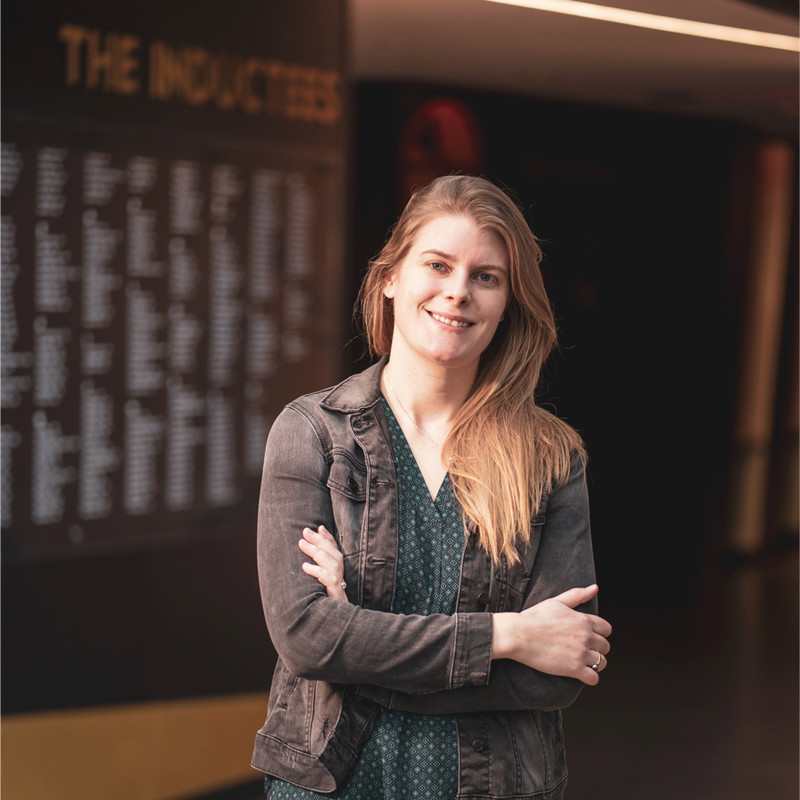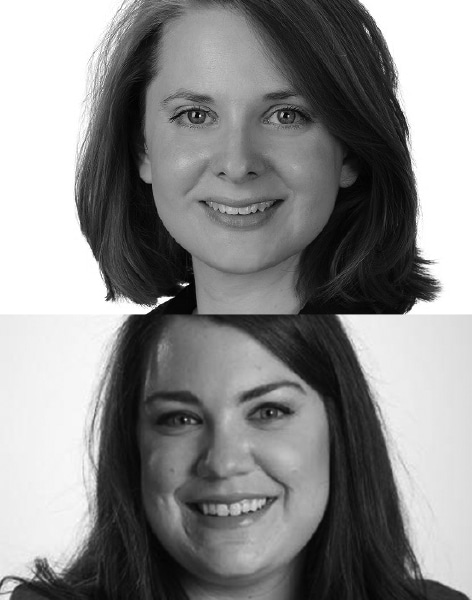Unscripted: Bonus Episode On AI & Machine Learning
Lauren Rothwell
Co-Founder & CEO of Blaze

This is one of them.
We had the pleasure of talking with Lauren Rothwell, Co-Founder and CEO of Blaze, to discuss the impact of AI and machine learning on the marketing landscape. From data collection and analysis to natural language processing and image generation, these technologies are transforming the way we approach marketing.
We’re excited to share our insights and perspectives with you. So, grab a cup of coffee, sit back and enjoy this unscripted chat about the future of marketing.
Tessa Burg is Host of the Leader Generation podcast and Chief Technology Officer at Mod Op after its acquisition of Tenlo in 2022. In her previous role as Vice President of Technology, she helped clients execute engaging, multi-platform experiences and products to bring their brands to life. In her role as CTO, Tessa oversees Mod Op’s technology stack to ensure the agency is leveraging the right platforms to deliver valuable and measurable marketing communications, entertainment and experiences.
Cheryl Boehm is Co-Host of the Leader Generation podcast Director of Copywriting at Mod Op. She’s a digital content writer who strives to deliver the best online experiences to customers and prospects that, ultimately, lead to company growth for clients. Cheryl pushes to personalize content strategy with an individual “cheat code” that empowers each client to reach their end game fastest.
Mat Segal is a Digital Producer at Mod Op. He’s a seasoned communicator and planner with a decade of experience bringing digital concepts and campaigns to market. With a specialty in digital strategy and production, he’s fluent in all aspects of digital marketing, from creative and launch to tracking and trafficking.
Watch the Live Recording
Cheryl Boehm: Hello, and welcome to a special bonus episode of the Leader Generation podcast. I’m Cheryl Boehm, a sometimes co-host and an all-the-time support behind the scenes.
Cheryl Boehm: We recently recorded an upcoming episode of Leader Generation with Lauren Rothwell, who is the CEO and Co-founder of Blaze. Sometimes the most interesting conversations we have with our guests happen before, or even after, our planned interview. And in this case, we had just finished the interview with Lauren, but we kept recording and we had a casual, unplanned conversation with her about artificial intelligence and machine learning and how companies are finally starting to understand how to use this technology to bring value to their business. It was such a good conversation that we wanted to share it with you.
Cheryl Boehm: Just keep in mind that the conversation does start a little abruptly since it was impromptu. And also make sure you check out the upcoming planned interview with Lauren Rothwell because it is another one you just don’t want to miss. Here you go!
Lauren Rothwell: Has that, have you, have you, do you kind of like, yeah. What kinds of talks have you been doing on these podcasts?
Tessa Burg: We’ve been talking about AI and machine learning for a while. Now, with ChatGPT, it just blew up because before it felt like speaking into a vacuum.
Lauren Rothwell: Yeah, yeah, yeah. So, we’re already getting a little more hits on those. Yeah, no, it’s super interesting though. Like there’s going to be a lot of, yeah, a lot of use cases. I mean, we’re already like using it. It’s pretty easy to deploy. Which means like probably there’ll be a lot of software tools that do it. And so, I think overall like it’ll be a lot about like the lock-in and like what else do they do and like what is the user experience because ultimately the technology is kind of, it’s there to do a lot of this. So yeah, it’s interesting.
Tessa Burg: And, you know, it’s funny you say that. Cheryl and I have been saying that for gosh darn stinking years. Is that.
Lauren Rothwell: Yeah.
Tessa Burg: It’s really interesting that the technology has been there for a while. You know, Cheryl tested a few different tools against ChatGPT and found that that one was the most effective, but it is also the user experience and the ability to market that product in a way that people understand.
Lauren Rothwell: Yeah.
Tessa Burg: You know, where I feel like that’s what was missing earlier on and what kind of led to that we’re speaking into a vacuum feeling.
Lauren Rothwell: Yeah.
Tessa Burg: Was like. We got so much feedback. Like we really don’t understand what you’re talking about. I’m like, what?
Lauren Rothwell: Yeah. Yeah. But now they do because everyone went on ChatGPT-3. And there was like. I think Jasper AI was one of the big ones and then they were actually using open AI. Like basically the ChatGPT-3 has been like available via API for businesses. It’s just been quite expensive, I think. And so, people don’t really, haven’t really tried it out. And then they were freaking out when ChatGPT came out. Because they were like, oh no! Like you’ve just completely made our product redundant. But now that they’re charging again, I think actually it’s all good, and open AI are still partnering pretty closely with the businesses themselves because they probably see that as more scalable anyway.
Tessa Burg: Yeah.
Cheryl Boehm: I mean there’s just, like you said, like Jasper and Frase.io and Persado and it’s been around, but I think with the ChatGPT, it’s just the user interface is so simple. That that is what made it more mainstream and what people gravitated to. I mean, I think the capabilities are stronger and some of those other platforms. I feel like it’s just that ease of use, you know that makes ChatGPT so popular.
Lauren Rothwell: Yeah, totally. Are you guys helping customers with that already? Or it’s like a new area of business that you’re kind of looking to market?
Tessa Burg: Yeah, we’re helping them already. We had a couple of really forward-thinking clients last year. We were able to do pilots and sort of show the difference between AI and machine learning campaigns and processes versus without.
Lauren Rothwell: Yeah.
Tessa Burg: And now I just feel like that conversation just got a heck of a lot easier. And especially when we can point to some use cases and scale it, it’ll be easier. But there also, the other piece, you know, what I think ChatGPT did that was really smart, is it was free, at first, Where when we were putting tooling in methodologies with clients, there’s an upfront investment.
Lauren Rothwell: Mm-hmm.
Tessa Burg: You know, if you’re modeling off pure data, there’s an upfront investment of a ton of time And then engineering. And then if you’re using a tool out of the box. Well, they’re trying to build a business. So, there’s like a really short free trial, but they’re, you know, machine learning, in general, takes time to really learn. And this was for campaign things. The natural language processing algorithm is obviously a lot more, it is faster. But I do think that this being free and really publicized, publicly, as something cool to try, and not set behind a price model, or a trial that doesn’t last long enough for anyone to prove anything out, went a long way. And now it makes the investments to use machine learning AI not look as big. Where before clients were like well I was paying $500 a month, or this was free because we were just doing it. I already have people doing it, you know. So now we don’t have to battle against the I already have people quote-unquote “doing it”.
Lauren Rothwell: Mm-hmm. Yeah.
Mat Segal: Free to try has been the best marketing for just parts of the industry. I remember it’s probably February 2020. To put a very bold stamp of when this happened. There was the tool going around that would do. It would colorize black and white photography using machine learning. And it got better every day to the point where, you know, I started off, and by the end you’re like, this just looks like an old photograph. And that’s like, oh, this isn’t scary. And this isn’t my memory of like a Turner Classic movie where they, you know, it’s been a colorized black and white movie. You’re like, oh, this is naturalistic. It’s not kind of weird.
Cheryl Boehm: Mm-hmm.
Mat Segal: And, you know, oh, what do you know, over the last few years we’ve been see seeing, you know, AI upscaling, you know, color correction, you know all of these become tool sets that aren’t scary because it’s like, no, it’s doing a good job.
Lauren Rothwell: Mm-hmm.
Cheryl Boehm: Yeah.
Tessa Burg: Yeah.
Lauren Rothwell: Well, yeah. Exciting, exciting times ahead. We’ll see if everyone is using it soon. I wouldn’t want to be a copywriter, let’s put it that way.
Tessa Burg: Cheryl’s a copywriter.
Cheryl Boehm: Yup.
Lauren Rothwell: Oh, I’m sorry.
Mat Segal: The trick we’ve seen with brands so far is, at least in my experience, not to speak globally. Is brands want to have a sense of what it’s been trained on, and usually something. So, the work for hire is, you know, oh, this copywriter has done all of this, and it’s been trained on their copy or our copy team, you know, whatever. So that we could guarantee that this isn’t journalist x, y z, and it’s going to just spit out of line, that you’re like, that’s plagiarism.
Lauren Rothwell: Yeah, yeah, yeah. That’s true. And you know that, yeah. It’s the right tone of voice and everything. Like there will always be a review, right? Like I don’t think people are just going to be like, hey just like automatically post her Twitter or anything. Like, there has to be a review. So that’s also. Yeah, that makes sense.
Tessa Burg: Yeah. Look, the one thing when Cheryl and I were talking about how it gives her superpowers, is every brand we work on wants to emote something different. And different for an email versus a tweet versus their copy. And that’s where like that human element comes in and Cheryl was saying, like, how we are doing some subject lines in an email, and she put in some ideas and got a bunch back. And she sort of took ideas from it to make, you know, the two to three that we were actually going to test. But with the right ombre and emotions that, you know, people respond to, and she can explain to the client, but it saves time, I mean.
Lauren Rothwell: Yeah
Cheryl Boehm: Mm-hmm.
Tessa Burg: Yeah. And, I mean, Cheryl knows, I’ve never been a writer. I’m terrible. So, I’m really excited, and I don’t even trust myself to go to the finished product, though. Like I like the options.
Lauren Rothwell: Yeah, yeah.
Mat Segal: But it makes me think about an interesting thing when you think about time saving is when, you know, we talk about multi-channel social. And you’re like, well our Twitter. Our Insta. On our Facebook are all, you know, similar but different users and, you know, they are similar but different audiences. So, we want to craft different messaging to go out. You know, associated with the same content. It’s like, here’s this video I made, but it’s going to these. Throw in LinkedIn just for fun.
Lauren Rothwell: Yeah.
Mat Segal: Having to write four different but the same pieces of social copy.
Tessa Burg: Yeah. Cheryl-
Mat Segal: When you’re doing a month out. There was a point in time where we were pumping out, oh, like roughly 65 pieces per month across multiple channels and you’re just hitting a wall.
Lauren Rothwell: Yeah, yeah, yeah.
Cheryl Boehm: That’s an amazing use case for it. Because like I’ve been testing a lot of different things and one was like, I took a paragraph I had written for, I don’t know, a website or something and then was like all right, shorten this to. I think it was LinkedIn. Shorten this to 150, you know, characters. And it got me pretty close. I still had to tweak it, you know, and then, you know, shorten this for whatever. And so, it definitely adds efficiency.
Cheryl Boehm: What does scare me is that there’s people that think that it’s the end-all be-all solution, and writers are not obsolete. And that is not the case at all. Because like we are saying, you know, every brand has its own voice and very specific characteristics or brand guidelines or whatever. And it takes a person to understand all of those things and understand what audience it’s for and how this audience is different than this one. And yeah, I was actually just working on something where it was multiple emails, but there was different personas we were targeting. So, like, you know, one was this age group. One was, you know, this set of people. And machine just doesn’t understand all those nuances, so.
Lauren Rothwell: Any of the tools you tried like Jasper and Frase and the likes. Did they, like, help with that? Like you put something in. They’ll give it to you in like five different formats. It’s more that you couldn’t maybe post from there.
Cheryl Boehm: Yeah, you can, and that’s another thing. You have to understand what those right prompts are. To give you the response that you’re looking for.
Lauren Rothwell: Yeah.
Cheryl Boehm: And if you don’t understand that and have that knowledge of like the clients and everything, you’re not going to get, you know, the output. It’s kind of like the whole garbage in, garbage out. You know? So.
Lauren Rothwell: Yeah, interesting. Yeah. Yeah. I feel like eventually we’ll probably add more integrations and like, we’ll have some of the tooling for us. We’re like, oh, maybe that’s a good product feature for us. Just like do it across the platforms, but probably not super imminent anyway.
Cheryl Boehm: Well, yeah.
Tessa Burg: One of the things we talked about last time we talked discord that I should have brought up here. Where this gets interesting is, right, with Belays you’re giving tools to moderators.
Lauren Rothwell: Mm-hmm.
Mat Segal: You’re not automating moderation because once you auto moderation it just becomes Facebook.
Lauren Rothwell: Yeah, yeah.
Tessa Burg: Right. That’s like a really good point. Don’t worry. What just happened here is another podcast episode.
Lauren Rothwell: Yeah.
Tessa Burg: We’re going to chop this into two.
Lauren Rothwell: Yeah.
Tessa Burg: There’s going to be our first one, with analytics and Discord and Blaze, and then this half, which is exploring AI and machine learning and platforms and for people and giving them superpowers. Or something that Cheryl will write.
Lauren Rothwell: Yeah.
Mat Segal: Fear of the robot future, question mark?
Lauren Rothwell: Awesome.
Tessa Burg: All right
Lauren Rothwell: See you guys later.
Tessa Burg: Thank you. See you later.
Cheryl Boehm: Bye
Mat Segal: Bye.
Lauren Rothwell
Co-Founder & CEO of Blaze

Lauren Rothwell is the Co-Founder and CEO of Blaze, a community growth tool It seamlessly centralizes data from key platforms like Discord and Twitter. This helps make community management and marketing easier. Plus, helps companies understand their users better, so they can create personalized experiences.


